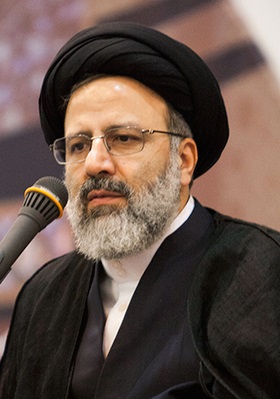March 15, 2019

Ultra-conservative Ebrahim Raisi has been named by Supreme Leader Ali Khamenehi as the new head of Iran’s Judiciary, replacing Sadeq Larijani, who has served two five-year terms.
The head of the Judiciary is named exclusively by the Supreme Leader. Since the start of the Islamic Republic, each Judiciary chairman has been allowed to serve two five-year terms.
Raisi, 58, is best known as the main conservative candidate who challenged President Hassan Rohani in the 2017 elections. He did not do well. Rohani easily won re-election with 57 percent of the vote to 38 percent for Raisi, with the remaining 5 percent going to two fringe candidates and to invalidated ballots.
A few days after being appointed to head the Judiciary, Raisi put another feather in his cap as he was elected deputy chair of the 88-cleric Assembly of Experts, the body that selects the Supreme Leader when that post falls vacant.
Raisi and outgoing Judiciary Chairman Sadeq Larijani both ran for the post. With 78 members present, Raisi got 43 votes or 55 percent, not exactly an overwhelming mandate from his fellow clerics. Raisi is widely touted as a possible successor to Khamenehi. The vote does not suggest he will be a shoe-in.
The deputy chairmanship opened up with the death in December of Ayatollah Mahmud Hashemi-Shahrudi.
Raisi has never held elective office and spent much of his career as a prosecutor, so his appointment to head the Judiciary is not out of the ordinary. Raisi was deputy prosecutor of Tehran in the mid-1980s, prosecutor from 1989 to 1994, Iran’s inspector general from 1994 to 2004, then deputy chief justice of the Supreme Court from 2004 to 2014 and national prosecutor general from 2014 to 2016, when he was picked by the Supreme Leader to head the Foundation of the Shrine of Imam Reza, the only one of Shiism’s 12 Imams to be buried in Iran. The foundation in Mashhad is perhaps the wealthiest organization in the country.
Raisi is only the second man to head the foundation since the revolution, and his selection for the post was widely seen as a key anointment by Supreme Leader Ali Khamenehi. Many commented that it put him in line to be considered to replace Khamenehi as Supreme Leader when Khamenehi passes away.
But many human rights activists strongly oppose Raisi, viewing him as one of the worst human rights violators in the regime.
This is based on his service in 1988 on the judicial panel in Tehran that plucked leftists from the prisons and had them summarily executed. Most, but not all, of those killed were members of the Mojahedin-e Khalq—and the executions took place in the weeks after that group’s “army” had invaded Iran from Iraq in a failed effort to topple the regime.
Hadi Ghaemi, executive director of the New York-based Center for Human Rights in Iran (CHRI), said, “Raisi should be prosecuted, not [made] head of Iran’s Judiciary…. The selection of Raisi … will send a clear message—the rule of law has no meaning in Iran, and those who participated in mass murder will be rewarded.”
Very unusually, the State Department also commented on the appointment. Spokesman Robert Palladino called the promotion of Raisi a “disgrace.”
At least 4,000 prisoners were executed in the fall of 1988, with some estimates reaching as high as 30,000.
The “death commissions” that decided who would live and who would die were set up on the order of Ayatollah Khomeini. They were not public bodies. The concentration on members of the Mojahedin-e Khalq indicated the executions were retaliation for the group’s military invasion in August 1988. But those executed were all sitting in Iranian jails at the time and obviously had no role in the invasion.
Raisi was one of four members of the Tehran “death commission” by virtue of his role as deputy prosecutor of the capital at that time. The other members were Tehran Prosecutor Morteza Eshraqi, Judge Hossain-Ali Nayeri and Mostafa Pur-Mohammadi, who was then the Intelligence Ministry’s representative at Evin Prison.
Grand Ayatollah Hossain-Ali Montazeri was strongly opposed to the mass executions and, in part for that opposition, lost his role as the designated successor to Khomeini. In an audio tape released a few years ago by his son, Montazeri is heard meeting with the Tehran death commissioners and telling them they would be remembered as “cruel criminals” if they did not stop. He said, “I believe this is the greatest crime committed in the Islamic Republic … and history will condemn us for it.”
